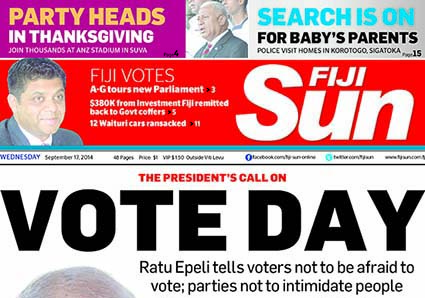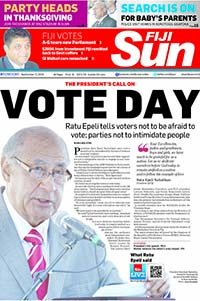
Thomas Carnegie
AUCKLAND (Pacific Scoop / Pacific Media Watch): The Fiji Sun is embracing new technology to make their daily newspaper more interactive for readers.
The news agency is introducing QR codes in printed articles covering the Fijian elections. Polling ended tonight and counting has begun.
These codes look similar to a barcode and link newspaper readers directly from the newspaper page to video and audio coverage through scanning with their smartphones.
The Fiji Sun is the first news service in Fiji – and probably in the Pacific – to use such a technology.
Publisher/CEO of the Fiji Sun Peter Lomas says these QR codes allow readers to easily access information.
“Our readers with a smartphone are now able to scan the QR code running alongside the report in the paper. This takes their smartphone straight to video, audio, photo galleries or fuller word details.
“For example, in the current election our journalists cover an event with photos and a report in the paper. Same time the QR code published with this links to video coverage they have done. Or an audio recording of a full interview, for example.”
Pacific growth The Fiji Sun’s editorial manager, Soko Vakacegu, says adopting new technology is important for the future growth of the Pacific.
The Fiji Sun’s editorial manager, Soko Vakacegu, says adopting new technology is important for the future growth of the Pacific.
“We are developing nations and we need everyone to understand the issues and be able to make informed decisions.
“The good thing in Fiji is we have the biggest and most diversified news media in the Pacific Islands. And it’s growing all the time. So is our internet use. Even remote rural schools now have media centres with multimedia access,” she says.
Vakacegu says the newspaper has embraced the new technology and it has changed the way their journalists are reporting.
“Our newsroom is mainly young and they have embraced this easily and enthusiastically.
They can see how they can quickly add value to their coverage through video of events and interviews and audio of major speeches.
Plus our photojournalists do a lot of good work. Now there might be one good photo they take in the paper and another nine or 10 for our readers through the QR code link.”
Smartphone revolution
Smartphones have seen massive growth throughout Fiji following telecommunication deregulation and reform in 2006.
Before these reforms, Fiji had some of the highest mobile phone prices in the world.
The Lowy Institute reports that this was due to a telecommunication monopoly that existed then.
However, the reforms ended this monopoly and within months of the onset of competition, the price of mobile phone calls had dropped by 44 percent and SMS text message charges had fallen by half.
Irish-owned Digicel launched in the Pacific Islands in 2006. This company has also played a major role in making smartphones affordable in the area.
For example, within eight months of Digicel entering the Papua New Guinea market in 2007, SIM card charges fell by 80 percent and the cost of mobile phones fell by more than a third.
Vakacegu says Fiji has experienced massive cell phone growth since 2006.
“There has been massive smartphone growth. The mobile company competition here is intense and this keeps prices down and gets best products being brought into the market.
“On top of that there are so many Fijians working overseas and bringing top phones home for their families when they visit or return.
“They all come home from time to time and guess what they include in what they bring for their family? The latest smartphones,” says Vakacegu.
Social media
With the growth of smartphones, many Fijians now have access to both the internet and social media.
This has had an influence on the elections with both political parties and the Fijian public taking to social media to campaign and show their support.
Political party Facebook pages have thousands of members and provide a platform for debate and commentary for the public on various political matters.
Twitter has also played a major role in the election, many have used the platform to comment on political matters and the electoral system.
Lowry Institute researcher Dr Jenny Hayward tweeted about its positive use earlier yesterday.
Great to see so many photos of people voting in #FijiElections being posted on Twitter today. Social media being put to good use.
— Jenny Hayward-Jones (@HaywardJenny) September 17, 2014
This work is licensed under a Creative Commons Attribution-NonCommercial 3.0 New Zealand Licence.




